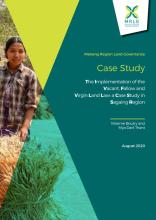Land Library
Bienvenue dans la bibliothèque du Land Portal. Explorez notre vaste collection de ressources en libre accès (plus de 74 000), comprenant des rapports, des articles scientifiques, des articles de recherche, des publications évaluées par des pairs, des documents juridiques, des vidéos et bien plus encore.
/ library resources
Showing items 1 through 9 of 167.Secure land tenure is key to eradicating poverty;increasing agricultural investment and ensuring food security;and is an essential element of climate action and climate resilience. Yet women have far weaker rights to land than men.
A policy brief introducing a new book edited by Khwezi Mabasa and Bulelwa Mabasa. The book examines how land and agrarian reform impacts nation building;citizenship and identity formation.
An encouraging story about how four communities regained control of their lands acquired by the Bioshape jatropha plantation in Kilwa District.
It is likely that rural women will disproportionately bear the socio-economic hardships from COVID-19. Restrictions on the movement of people and goods are disrupting agricultural value chains and food systems.
Land in Cameroon is under growing pressure – powerful commercial interests;changing climate conditions and shifting demographic flows including mass migration and increasing population density.
This Case Study looks at the implementation of the Vacant, Fallow and Virgin Lands Management Law (VFV Law) in seven villages in Sagaing Region, to assess the practices on the ground and how the law impacts the land tenure security of smallholder farmers.
Covers key policy recommendations from a recent study.
This commentary highlights the importance of land tenure security for women and indigenous peoples. Land titles are often used as a proxy for women’s land security;but focusing on titling alone does not lead to greater tenure security for women.
Liberia has long maintained a dual land tenure system over statutory and customary lands characterized by unclear terms of ownership. Most rural Liberians depend on common resources for their survival. These are largely communally owned;used and managed.


